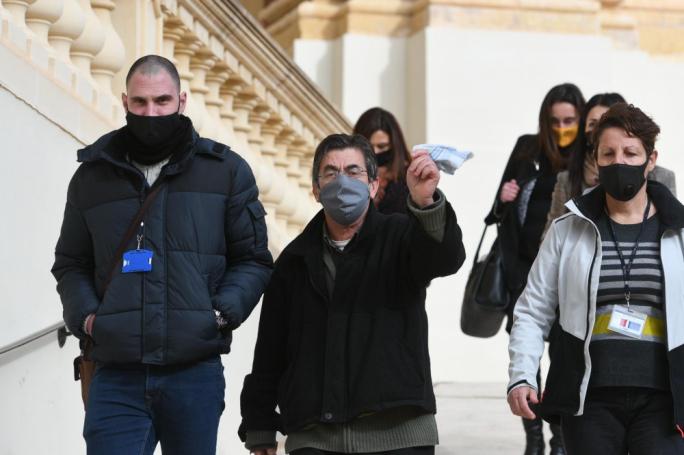|
Sex abuse in the Church: majority of victims don’t report cases, says expert
By Laura Calleja
Psychologist who followed 80 patients with drug problems who experienced child and adolescent abuse never opened up about their abusers Victims of child and adolescent abuse rarely report their abuse, meaning many perpetrators are still within the community, a 2000 study by psychologist Mariella Dimech of 80 people with drug problems had found at the time. ‘Numbing The Pain’ focused on the link between child and adolescent abuse and drug addiction by following 80 people who had drug problems over time – 90% of these vicims had been abused during childhood and adolescence. “The abuse was sexual, physical, and emotional and or neglect,” Dimech said, who was asked to comment on the recent arraignment of two Gozitan priests for the alleged rape of an altar boy. “100% of the victims never reported their abuse. This means that no help was given, offered or perceived as being available. This also means that all the perpetrators are still out there,” Dimech said. In 2019 there were 26 court cases related to paedophilia, whose perpetrators were in the main male (24). Every month, social welfare agency Appoġġ receives two to five sexual abuse cases. Why do victims not come forward? Dimech said that victims are likely not to come forward because of shame. “It is extremely shameful for the abused person to expose themselves even more and relive their abuse through their sharing of events. To be in a situation of total submission is in itself so damaging and hurtful that to present yourself in that way is repeatedly very difficult,” she said. Dimech said a child might also feel guilty for not stopping the abuse, not realising they are able to. “They may feel guilty if they believe that if they speak out, the entire family will all suffer, and they may be afraid of the reaction to speaking out.” Fear plays a part in the inability of victims of sexual abuse to come forward and report abusers. “85% of the victims were abused from family members, clergy, carers or close family friends. There would be times when the children or adolescents had no one to turn to, did not trust anyone since the people who were supposed to care for them were the ones abusing them, or allowing the abuse to continue, or even worse, did not believe what the child is saying,” Dimech said. Dimech also warned that abuse might be becoming normalised, leading to serious problems as adults – either continuing to be abused as adults or be abusive or finding it very hard to have a healthy relationship. “However, when people speak out and receive help, there is always hope for closure and moving on. Some people are beautifully resilient and manage to grow even out of such nightmares,” she said. Trusted adults are the main perpetrators “The most striking information that evolved in this study is the sad truth that trusted adults were the main perpetrators,” Dimech said, an observation that chimes in with the allegations against alleged paedophiles within the ranks of the Catholic church. “These were shocking accounts of children being abused while family members are in the next room, of children becoming confused because the person who the family trust and look up to is touching them, fondling them, forcing them to perform acts that they know are not right.” Dimech said she heard accounts of others who were aware their child was being abused, but chose to ignore or block out the abuse, or even allowing the abuser to have opportunities to continue to make their child suffer. Dimech said she heard accounts of clerics being allowed to continue to have opportunities to abuse and not be stopped – she said in many cases, the members of the clergy were allowed to be relocated to other countries, allowing them to continue to work with children. Reacting to the case in the press this week – of two priests charged with sexual abuse of an altar boy – Dimech asked: “I’m curious about the fact that the Archbishop of Gozo was informed two years ago of the latest accusations. Where were these priests in the past two years?” she asked. “Sending paedophiles to prison is a punishment. A paedophile has very serious psychological problems and is a great danger within society. Prison changes no-one: it punishes. And yes, sometimes that is necessary, but when a paedophile leaves prison, he or she still has the same problems.” Dimech said paedophiles often are unable to control their impulses, therefore, more children will be abused unless they undergo intense therapy and constant monitoring after prison. “On paper, this can be done effectively; however, it is very dangerous to not do this job well and efficiently like many other social problems. Many adults today are suffering the consequences of abuse as children and adolescents – drug abuse, alcoholism, other addictions, anxiety, depression, self-destructiveness, insecurity, and so much heartache in relationships.” Dimech said that many children in the present moment were being abused, “with the belief that nobody can save them, and without realising they are innocent and that they will not be judged, or shown anger or be ignored. “If found guilty, the accused priests will have done so much damage. As a society we need to offer a better way forward to let children know they are protected and not guilty, as much as we need to make sure that abusers are not just punished, but make sure they will never have the opportunity to abuse again.
|
.
Any original material on these pages is copyright © BishopAccountability.org 2004. Reproduce freely with attribution.
